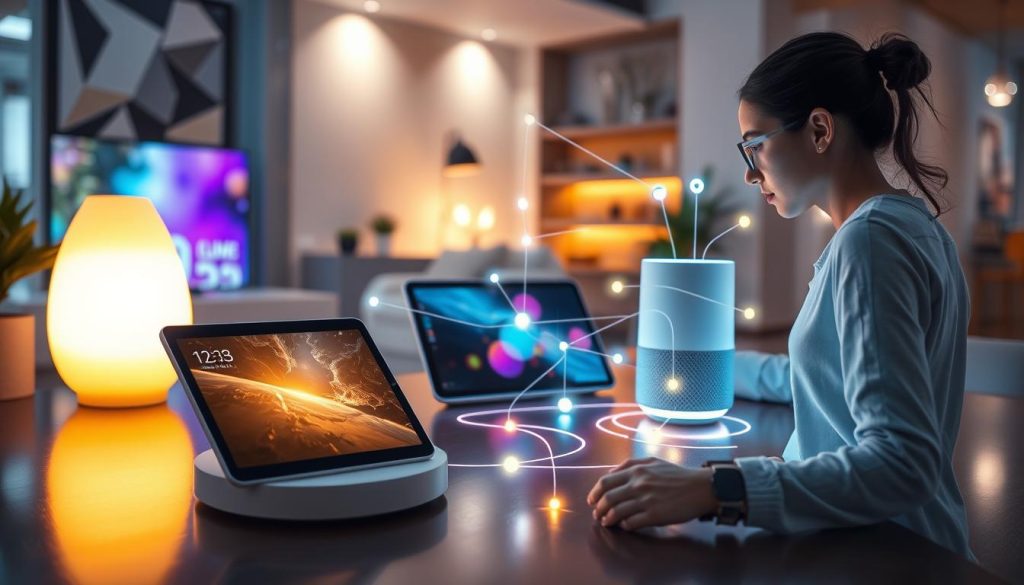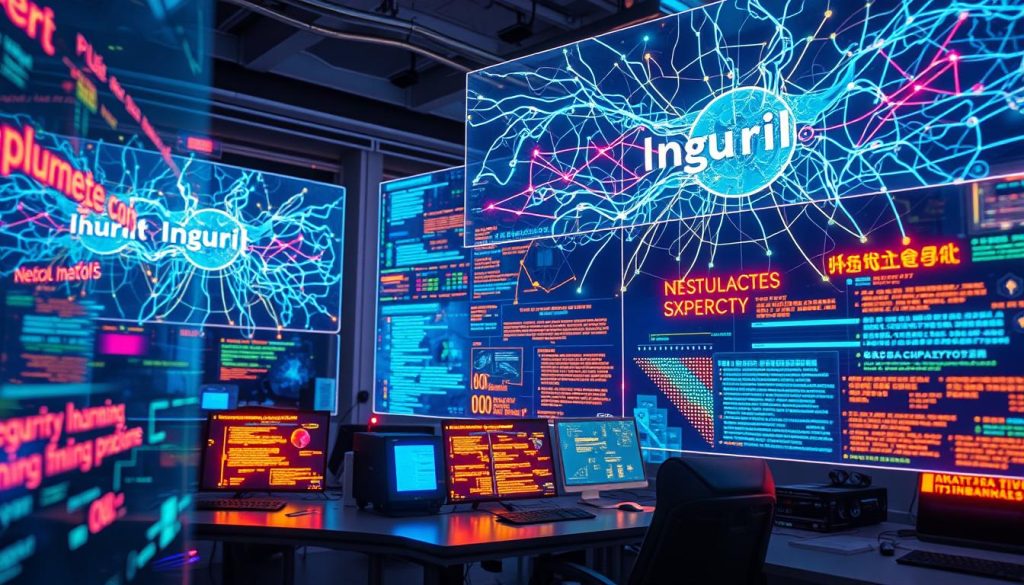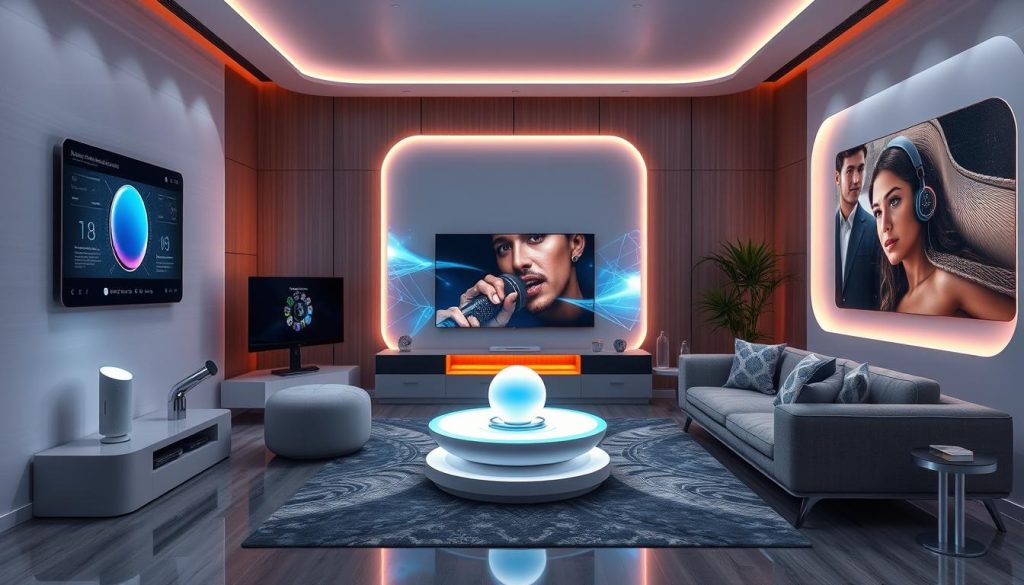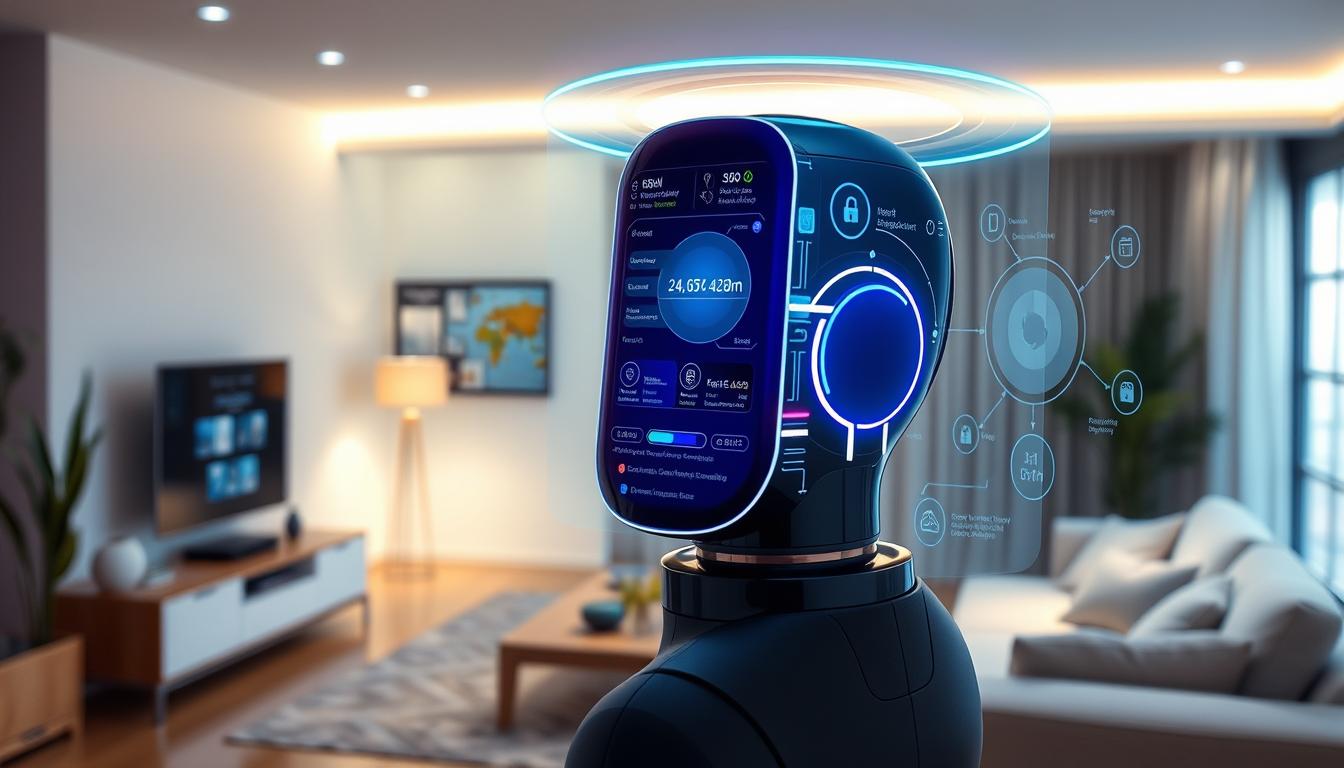Are you ready for the latest in smart assistants? We’ll explore new trends in AI and digital friends. You’ll learn about natural language and ethical AI.
By 2025, smart assistants will change a lot. What new things will they do for us? Get ready to see the future of smart helpers.
Key Takeaways
- Advancements in natural language processing enable more natural and contextual conversations
- Incorporation of multimodal interfaces for seamless integration across devices
- Personalized experiences powered by predictive analytics and adaptive learning mechanisms
- Enhanced privacy and security measures to protect user data
- Ethical AI implementation to ensure transparent and unbiased decision-making
Understanding the Evolution of Smart Assistant Technology
Smart assistant technology has grown a lot. It’s now more than just simple commands. Today, these smart helpers can understand complex questions and talk like humans. This change is thanks to better machine learning, which helps them learn and give us what we need.

From Simple Commands to Complex Interactions
At first, Apple’s Siri and Amazon’s Alexa could only do simple things. But now, they can handle many tasks. They can give us detailed information and even make suggestions for us.
The Role of Machine Learning in Assistant Evolution
Machine learning has greatly improved smart assistants. It lets them learn from large amounts of data, allowing them to talk to us more naturally. They’re now key in AI conversations and understanding language.
Current Market Leaders and Their Innovations
- Google Assistant is now a big player. It’s great at understanding language and works well with Google.
- Amazon Alexa is still a top choice for smart homes. It can control many devices and offer voice services.
- Apple’s Siri has gotten better. It now understands more and can handle harder questions.
Looking ahead to 2025, smart assistants will get even better. They’ll offer more advanced features and personal experiences.
Emerging Trends in Smart Assistants Technology for 2025
The world of voice assistants and smart tech is changing fast. By 2025, we’ll see big changes in how we talk to our digital friends. These changes will make our digital helpers more personal and smart.
Voice assistants will get better at understanding us. They’ll have AI that lets them talk like us. This means we’ll have easier and more natural conversations with them.
Multi-modal interfaces will also become more common. Smart helpers will use touch, gestures, and even our bodies to talk to us. This makes using them feel more natural and fun.
Smart tech aims to provide personalized experiences. By learning what we like and need, it can give us advice and help that’s just right for us.
The future of smart tech is exciting. With these new trends, our digital friends will change how we live. We’ll see more seamless, personal, and fun ways to use them.
Advanced Natural Language Processing Capabilities
The future of smart assistants looks bright. They will get better at understanding us. This means talking to AI will feel more natural and clear.
Multilingual Support and Real-time Translation
Soon, smart assistants will speak many languages. This will help people from all over talk to their AI friends easily. They will also translate in real-time, making it easy to talk across languages.
Context-Aware Conversations
Future smart assistants will get what you mean. They will understand your words, tone, and what’s happening around you. This means they’ll talk to you in a way that feels right.
Emotional Intelligence in AI Interactions
AI will soon feel and understand our feelings. This will make talking to AI feel more like talking to a friend. It will make our interactions with AI more meaningful.
“The future of natural language processing in smart assistants is a true testament to the incredible advancements in artificial intelligence. These capabilities will transform the way we interact with technology, making our lives more seamless and intuitive.”
These new NLP skills will make AI assistants very helpful. They will understand us better, talk to us in our language, and even feel our emotions. The future of talking to AI is exciting.

Multi-Modal Interfaces and Cross-Device Integration
Smart assistant tech is getting better. Now, we see more voice, touch, and visual inputs together. This change will make using digital helpers smoother on phones, smart homes, and wearables.
These new features will help smart assistants understand us better. They will guess what we want and give us what we need on different devices. This will change how we use tech, making it smarter and more personal for each of us.
“The future of smart assistants lies in their ability to seamlessly integrate across multiple devices and modalities, creating a truly personalized and adaptive user experience.”
Predictive Analytics and Personalized Experiences
Smart assistants are getting smarter. They use AI-driven personalization. This means they can guess what we need and like better than ever.
Behavior Pattern Recognition
Smart assistants learn from our habits. They understand our daily lives. They then suggest things we might like, based on what we do and like.
Customized Recommendation Systems
These smart helpers get even better at suggesting things we might enjoy. They might pick the right music for our morning or suggest restaurants we’ll like. This makes finding new things easy and fun.
Adaptive Learning Mechanisms
But the best part is how they keep getting better. With adaptive learning mechanisms, they learn from us. This means their suggestions get better with time.
“The integration of predictive analytics and personalized experiences in smart assistants is a game-changer, empowering us to discover new and relevant content with ease.”
By 2025, smart assistants will be even more amazing. They will guess what we need and like. This will change how we use technology and see the world.
Privacy and Security Enhancements
The world is getting more digital. This makes (privacy and security) in smart helpers very important. Soon, we’ll see big steps in keeping data safe and making sure users know how their info is used.
Keeping user data safe will be a big focus. Companies will work hard to make sure data stays private. They will also make it easier for users to control their info.
Being open about how data is used will also be key. Smart helper makers will have to tell users how they use their info. This will help build trust and keep users happy with these new techs.
As smart helpers become a big part of our lives, finding the right balance is hard. But, with new ideas and a focus we can enjoy these techs safely.
“The future of smart assistants lies in their ability to understand and respect the data protection needs of their users.”
Ethical AI Implementation in Smart Assistants
Smart assistant tech is getting better fast. But, we must think about ethics more now. In 2025, we’ll focus on three big things: making AI choices clear, stopping bias, and keeping user data safe.
Transparency in AI Decision Making
AI systems in smart helpers need to be clear to us. We should know how our data is used and why AI makes certain choices. This way, we can trust and understand the tech better.
Bias Prevention Measures
It’s key to making AI fair for everyone. Creators must test AI to find and fix biases. They need to keep checking and tweaking AI to avoid unfairness.
User Data Protection Standards
Smart helpers collect a lot of our data. We need strong rules to keep this data safe. This includes making data anonymous and getting our okay before using it.
Ambient Computing Integration
As we move towards a more connected future, smart assistants are key. They will make our homes, offices, and public spaces smarter. The idea of ambient computing is changing how we live.
The Internet of Things (IoT) has made many smart devices common. These include smart lights, climate control, and security systems. Smart assistants will make these devices work better together.
Imagine your smart assistant changing the room’s temperature and lights when you enter. Or it could help you save energy by giving tips. This is the future we’re heading towards.
Smart assistants won’t just be for homes. They’ll also be in public places. They’ll give us info, help us navigate, and suggest things we might like. It’s all based on what we like and do.
“The ultimate goal of ambient computing is to create a seamless, intuitive, and responsive environment that anticipates our needs and enhances our daily lives.”

As tech and our world get closer, smart assistants will lead the way. They will bring us into a new era This will change how we interact with our surroundings.
Conclusion
As we’ve looked at the future of smart assistants, it’s clear big changes are coming by 2025. New techs like better natural language, multi-modal interfaces, and predictive analytics will make AI more personal and smart.
Adding ethics, better privacy, and easy integration will make these changes good and safe. The future of AI assistants looks very promising. It could change how we use our devices and interact with the world.
I’m excited about the technological advancements to make our lives better. They will help us do more and connect deeper with our user-centric AI helpers. The future is looking bright, and I’m eager to see these changes in our lives.
FAQ
What are the emerging trends in smart assistant technology for 2025?
In 2025, smart assistants will get better at understanding us. They will use many ways to talk to us, like voice and touch. They will also learn what we like and keep our info safe.
How will natural language processing capabilities evolve in smart assistants?
Smart assistants will get smarter at talking to us. They will understand many languages and know what we mean. They will even feel emotions, making them seem more like friends.
What role will multi-modal interfaces play in the future of smart assistants?
Smart assistants will use many ways to talk to us. They will listen, see, and touch. This will make using them easier and more fun, no matter the device.
How will predictive analytics and personalization enhance smart assistant experiences?
Smart assistants will guess what we want before we ask. They will learn our habits and give us good ideas. This will make our lives easier and more fun.
What privacy and security measures will be implemented in smart assistant technology?

Companies will make sure our info is safe. They will use strong codes and ask for our okay. This will help us trust them more.
How will ethical AI implementation shape the development of smart assistants?
Making smart assistants fair and safe is important. They will be open about how they work and keep our data safe. This will make us feel good about using them.
How will smart assistants integrate with ambient computing environments?
Smart assistants will fit right into our homes. They will work with our gadgets and make our homes smarter. This will make our lives easier and more fun.
